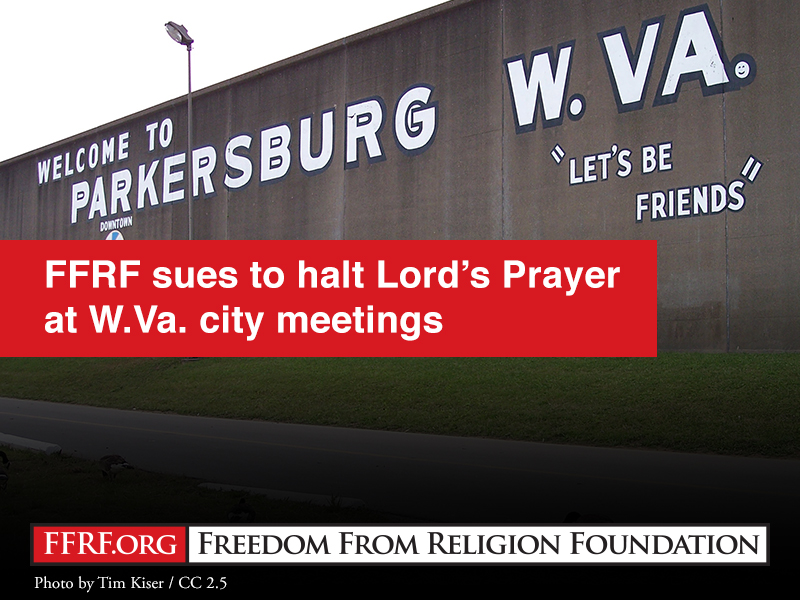
The Freedom From Religion Foundation has filed a motion for summary judgment against a West Virginia city’s unconstitutional prayer practice.
FFRF and two of its local members sued the city of Parkersburg, W.Va., in 2018 in the U.S. District Court for the Southern District of West Virginia, to challenge the City Council’s formal recitation of the Christian “Lord’s Prayer” to officially open every City Council meeting. The recited version is a biblical translation of Matthew 6:9-13 and concludes with a Christian doxology. Council members lead the prayer and are joined by city residents at each meeting in reciting it. FFRF charges that the prayers violate well-established law and exclude residents who are non-Christian.
“The practice continues today in the face of plaintiffs’ objections and well-established law barring legislators from reciting prayers from exclusively one faith in local government meetings,” the just-filed brief states. “Through its commitment to this practice and tradition, Parkersburg has essentially adopted the Lord’s Prayer as the official prayer of the city.”
“As non-Christians, the practice conveys a message of exclusion to plaintiffs,” the brief adds. “The influence of elected officials — vested with the legislative and policy-making authority of the city — leading a communal recitation of a doctrinal Christian prayer pressures plaintiffs to participate. As a result, plaintiffs have withdrawn from attending public meetings, though they remain interested in taking part in their local government.”
The city of Parkersburg has filed a brief of its own in response asking for judgment in the city’s favor.
The local plaintiffs include Daryl Cobranchi, who in the past had frequently attended meetings and been directed to stand for the Lord’s prayer, a practice, he notes, that has made him conspicuous by his nonparticipation and which “assigns to second-class status anyone who is not Christian.” Likewise, Eric Engle, also a Parkersburg resident, follows city matters and has felt uncomfortable and pressured to participate in the Christian prayer during public meetings.
At least one member of the City Council has been openly hostile to nonparticipants, the lawsuit charges. Councilman Eric Barber glared at attendees who sat during the prayer at a meeting. At the end of that prayer, Barber positioned himself near his microphone, pressed the button, and shouted, “Amen.”
The 4th U.S. Court of Appeals held in 2017 that sectarian legislator-led prayers were unconstitutional in the case Lund v. Rowan County, N.C. The opinion said, “The principle at stake here may be a profound one, but it is also simple. The Establishment Clause does not permit a seat of government to wrap itself in a single faith.” Given the similarities between Parkersburg’s prayer practice and the Rowan County practice struck down by the 4th Circuit, Lund controls this case, FFRF asserts. Most importantly, both cases involve prayers promoting a single faith delivered exclusively by lawmakers year after year.
Because the city of Parkersburg is in fact promoting a single faith, the plaintiffs are entitled to judgment in their favor, FFRF concludes. FFRF seeks a permanent judicial injunction enjoining the inclusion of the Lord’s Prayer as a ceremonial prelude to Parkersburg meetings. In addition, FFRF asserts, plaintiffs are entitled to nominal damages for their past injuries arising from the city’s prayer practice.
The Freedom From Religion Foundation, acting as a plaintiff in the case as well, is a nonprofit corporation that advocates for the separation of state and church and educates on matters of nontheism. FFRF has over 31,000 members nationwide, including in West Virginia. Marcus B. Schneider, Kristina Thomas Whiteaker, and FFRF Attorneys Patrick C. Elliott and Christopher Line are co-counsel on the case.